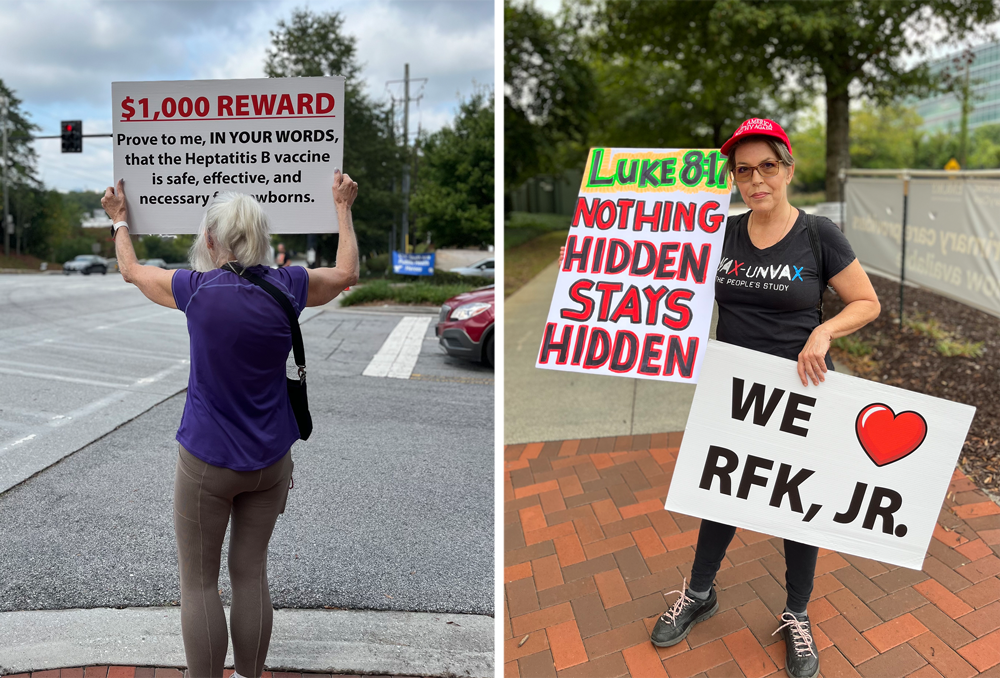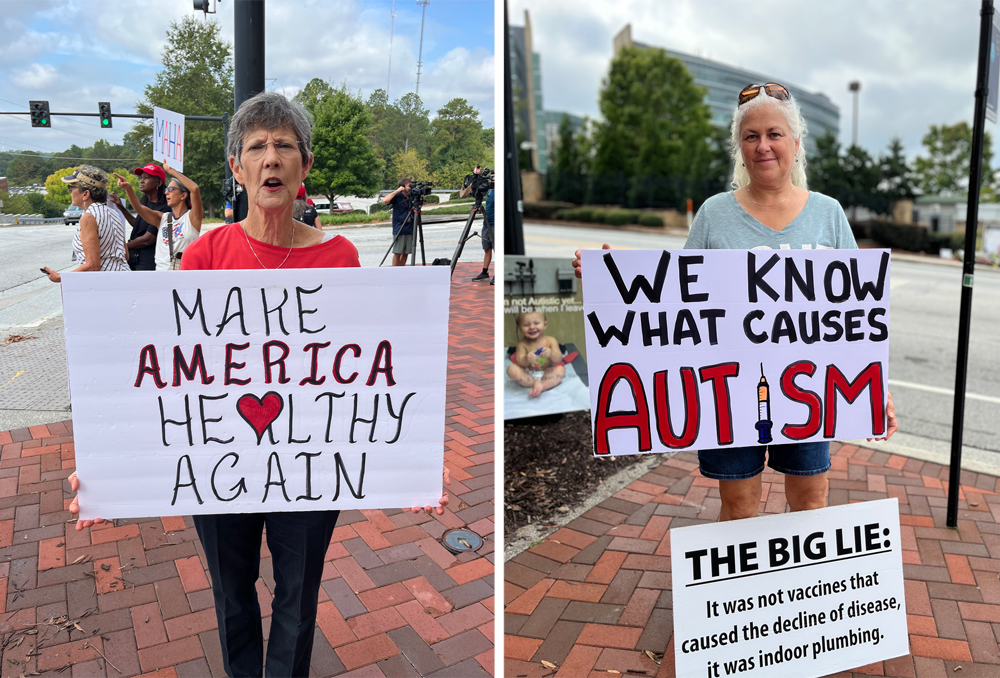Activists gather for a rally to support Health and Human Services Secretary Robert F. Kennedy, Jr. outside the CDC headquarters in Atlanta, Georgia, on September 26, 2025. Kiera Butler
On Friday morning, a group of about 20 anti-vaccine activists gathered across the street from the Atlanta headquarters of the Centers for Disease Control and Prevention in support of Health and Human Services Secretary Robert F. Kennedy Jr., and promoted by Children’s Health Defense, the anti-vaccine advocacy group he led before he entered politics. The rally attendees showed up to support Kennedy during a week when he came under fire for a particularly rambling press conference, where he and President Trump blamed the over-the-counter painkiller Tylenol for what they described as an autism epidemic.
The location of the event was significant; it took place in front of the CVS pharmacy where a gunman opened fire last month, killing police officer David Rose. The shooter, who died of a self-inflicted gunshot wound, reportedly was targeting CDC headquarters because he blamed Covid vaccines for his mental illness.
Some of the messages on the attendees’ signs were simple expressions of anodyne support—“Make America Healthy Again”, for instance, and “Thank You, RFK Jr.” But others were more unusual. One woman carried a sign announcing, “I am Charlie Kirk,” a reference to the conservative activist who was assassinated in Utah earlier this month and has become a symbol of free speech activism on the right. Other signs referenced bible verses, and one said “Anti-Science, Pro-Informed Consent.”

Two of the attendees told me they worked with autistic children. Christy Kennedy, an occupational therapist in Decatur, Georgia, said she came to the rally because she believed “we have children that are in dire need to get help, but not pharmaceutical help.” Sometimes, she said, she brings up the dangers of vaccines with families in her practice. “This is a very, very sensitive topic because it’s become so politicized,” she said. “If I feel that a parent is open to the idea, then I will broach the concept.”
“Once you learn that truth, you become less resistant to learning more truth, so I learned about fluoride and chemtrails.”
Mike Arnold, who explained that he worked as a therapist with autistic children but declined to say in what capacity, said he had protested outside the CDC every day for seven years, carrying signs bearing slogans about the supposed link between vaccines and autism. Not that the issue had always interested him. His journey “down the truth rabbit hole” began around 2008, on internet forums where he became convinced that the 9/11 attacks were the work of the US government. “Once you learn that truth, you become less resistant to learning more truth, so I learned about fluoride and chemtrails,” he said. “I learned that story—the Rothschilds and the Rockefellers, and how they funded the UN. Elon Musk is not the richest person in the world. He has nothing compared to the Rothschilds. They basically own the Federal Reserve.” (The Rothschilds are the Jewish family at the center of a modern antisemitic conspiracy theory, and they do not have any influence on the Federal Reserve.) His research led him to believe that many other supposed conspiracy theories were actually true. “Let’s just say I’m Jewish, and I can get away with saying certain things that other people would call antisemitic,” he said. “Yeah, some of those things are true.”
Most of the attendees I spoke to approved of Trump’s message that pregnant women shouldn’t use Tylenol, despite the fact that it is the only safe way to prevent birth defects caused by maternal fever.

Kendra Foltz Biegalski, the chair of DeKalb County Republican Party, said she had come to the rally because she is “a big fan of RFK Jr. and his program to make America healthy again.” Though she was a bit fuzzy on the details, Trump’s announcement about Tylenol causing autism seemed important to her. “I hope that women take the recommendations to heart,” she said, “and just try to be healthy when you’re pregnant, eat whole foods, and reduce any type of chemicals or man-made products that you’re putting in your body.”
Biegalski wasn’t the only attendee involved in local politics. Phoebe Eckhardt, who lost a bid to represent Georgia’s 47th Congressional district last year, said she came to the rally because she didn’t want children to be “harmed by vaccinations and wrong medical procedures.” She wasn’t worried about the return of infectious diseases like measles and polio, and, like Trump, cited the example of the Amish. They “don’t have any of these diseases at all, because they don’t get vaccinations,” she said. “They don’t take any of this medication from all of these doctors, they trust God.” (The assertion that there is no autism in the Amish community, a common anti-vaccine talking point, is demonstrably false.) Eckhardt’s voice swelled with emotion as she talked about what she considered to be a campaign by the pharmaceutical industry to lie to Americans. “Television has been programming Americans for 50 years, and I’ve been one of them, but I’m not anymore—so wake up and smell the roses of what real life is all about!” she said. “I am Charlie Kirk!”
About an hour into the rally, no counter-protesters had shown up, though some drivers who passed by rolled down their windows to boo the people who had assembled. Across the street at the CDC Headquarters was a small memorial to Officer David Rose and homemade signs expressing support for some 600 workers who had been laid off or placed on administrative leave during the upheaval and massive shrinking of the agency under Robert F. Kennedy Jr. “The CDC must restore public trust,” Kennedy wrote in a recent Wall Street Journal op-ed. “And that restoration has begun.”




























